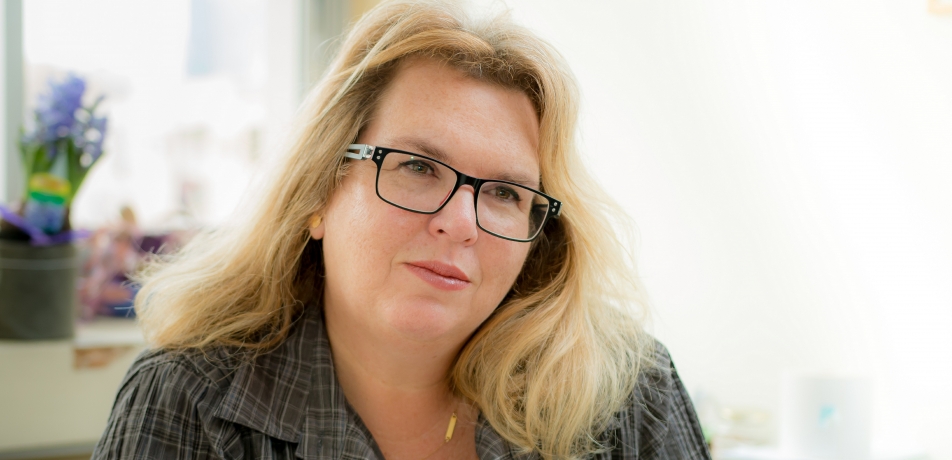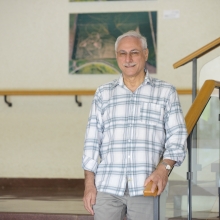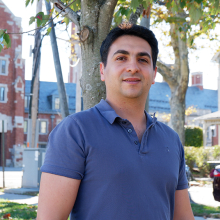Safeguarding our H₂0
Dr. Vaizel-Ohayon is keeping Israel’s water safe
Alumni

Dr. Dalit Vaizel-Ohayon
As Israel increasingly relies on desalination to quench the thirst of its rapidly growing population—nearing 8.5 million, on a mere 8,400 sq. miles of land—microbiologists must react with unprecedented speed and precision to monitor the nation’s water quality.
Among the top minds at the helm of this mission is Weizmann Institute alumna Dr. Dalit Vaizel-Ohayon, Chief Bacteriologist at Mekorot, Israel’s national water company. Her daily responsibilities amount to nothing less than keeping Israel’s entire water supply safe for consumption.
“We are responsible for delivering water in drinking quality to the gates of the cities,” says Dr. Vaizel-Ohayon, who received her PhD from the Weizmann Institute's Department of Molecular Genetics.
Today, Israel’s water supply is experiencing what Dr. Vaizel-Ohayon describes as a “total transformation.” She has been in her role for a decade and has witnessed the change. Until about 10 years ago, some 50 percent of the country’s drinking water originated from the Kinneret and the remainder came from aquifers. But the tables have turned, and today some 70 percent comes from the sea and undergoes a desalination process, while the remainder is pumped from aquifers. Due to prolonged droughts over the past decade, the Kinneret now supplies a much smaller fraction of the supply.
In the days when the lion’s share originated in the Kinneret, the water flowed for several days through the National Water Carrier pipes before reaching homes for consumption—giving microbiologists like Dr. Vaizel-Ohayon ample time to conduct quality control. Now, however, with five large desalination plants located along the Mediterranean coast in the country’s central and southern regions—Ashdod, Ashkelon, Palmahim, Sorek, and Hadera—most drinking water arrives at Israeli homes within several hours. As a result, the Mekorot team led by Dr. Vaizel-Ohayon must work fast. That means employing the most cutting-edge technologies and testing the water immediately.
Traditional examination methods take at least 24 hours to provide answers—which is too long for today’s source-to-sink timeline. So Dr. Vaizel-Ohayon and her team are now using these methods in addition to employing a variety of rapid-testing technologies. Those include the “quantitative polymerase chain reaction” (qPCR) technique, which massively replicates segments of DNA to look for the presence of infectious agents such as fecal coliform, streptococcus, and parasites. Her team is also employing new online tools that enable real-time monitoring of bacteria as well as of pH, chlorine, and turbidity. One particularly innovative instrument that the lab has begun to use is Colifast™, an instrument from Norway that tests fecal coliform bacteria in water supply systems.
“Molecular techniques and recent breakthroughs in DNA—such as qPCR and Next Generation Sequencing—and microscopy have given us a new set of tools for microbial water quality testing, and the name of the game today is speed and a full picture,” says Dr. Vaizel-Ohayon. “So we need to keep on top of the latest and greatest techniques and make sure they can give us reliable results in a matter of hours. In addition, we believe that defining the microbiome in water supply systems and treatment plants by using Next-Generation Sequencing will probably enable more precise monitoring and treatment for specific target bacteria.”
When contamination is suspected—which typically occurs once every few months—Dr. Vaizel-Ohayon, together with Mekorot’s water quality engineers, analyzes the possible source of the irregular result and identifies the actions necessary to eliminate it.
Dr. Vaizel-Ohayon attributes much of her scientific curiosity and drive to take on new challenges to her time spent at the Weizmann Institute. She completed her MSc in the lab of Prof. Yosef Shaul, studying the Hepatitis B virus. She completed her PhD in 2000 on the embryonic development of drosophila fruit flies, under the supervision of Dr. Eyal Schejter, now a senior staff scientist in Prof. Ben-Zion Shilo’s lab. Before Mekorot, Dr. Vaizel-Ohayon worked in a biotech startup for five years. The analytical skills she acquired while conducting her MSc and PhD projects gave her the experience necessary to build her career at Mekorot, where she became fascinated by the subjects of environmental microbiology and water quality.
“At Weizmann, I learned not to be afraid to explore new things,” she says. “Weizmann taught me to keep my mind open at all times—and to believe that we can constantly develop ourselves.”
Dr. Vaizel-Ohayon collaborates with the Water Authority and the Health Ministry, the government agencies responsible for determining water quality policy and management.
Her work is unique in part because Israel’s water system is unique. While other countries are only beginning to employ desalination to boost their water supplies, most still rely predominantly on ground and surface water—managing their resources locally and drawing from multiple wells and rivers. Israel, meanwhile, has one national system, now based mostly on desalination, that requires transporting water across the country.
“As other countries look to Israel as leader in desalination, water reuse, and quality control, they could also learn how to create and optimize one unified structure for managing such a precious resource,” Dr. Vaizel-Ohayon says.
“The thinking of Israel as a whole, as a complex, not as localities—that’s what gives us the advantage,” she adds. “In every house, there is always water, and always quality water.”








